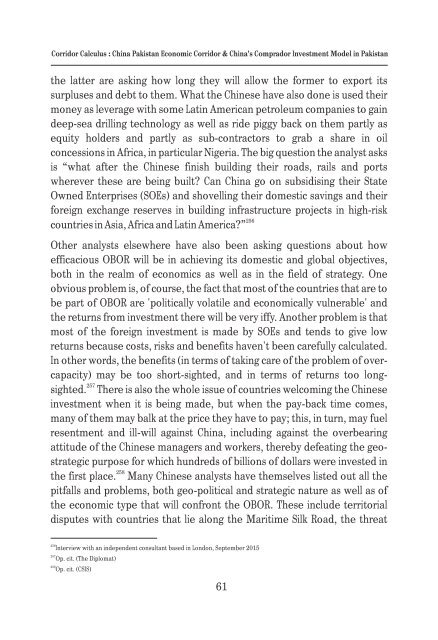Corridor Calculus
corridor-calculus-china-pakistan-economic-corridor-and-china-s-comprador-investment-model-in-pakistan
corridor-calculus-china-pakistan-economic-corridor-and-china-s-comprador-investment-model-in-pakistan
Create successful ePaper yourself
Turn your PDF publications into a flip-book with our unique Google optimized e-Paper software.
<strong>Corridor</strong> <strong>Calculus</strong> : China Pakistan Economic <strong>Corridor</strong> & China's Comprador Investment Model in Pakistan<br />
the latter are asking how long they will allow the former to export its<br />
surpluses and debt to them. What the Chinese have also done is used their<br />
money as leverage with some Latin American petroleum companies to gain<br />
deep-sea drilling technology as well as ride piggy back on them partly as<br />
equity holders and partly as sub-contractors to grab a share in oil<br />
concessions in Africa, in particular Nigeria. The big question the analyst asks<br />
is “what after the Chinese finish building their roads, rails and ports<br />
wherever these are being built? Can China go on subsidising their State<br />
Owned Enterprises (SOEs) and shovelling their domestic savings and their<br />
foreign exchange reserves in building infrastructure projects in high-risk<br />
256<br />
countries in Asia, Africa and Latin America?”<br />
Other analysts elsewhere have also been asking questions about how<br />
efficacious OBOR will be in achieving its domestic and global objectives,<br />
both in the realm of economics as well as in the field of strategy. One<br />
obvious problem is, of course, the fact that most of the countries that are to<br />
be part of OBOR are 'politically volatile and economically vulnerable' and<br />
the returns from investment there will be very iffy. Another problem is that<br />
most of the foreign investment is made by SOEs and tends to give low<br />
returns because costs, risks and benefits haven't been carefully calculated.<br />
In other words, the benefits (in terms of taking care of the problem of overcapacity)<br />
may be too short-sighted, and in terms of returns too long-<br />
257<br />
sighted. There is also the whole issue of countries welcoming the Chinese<br />
investment when it is being made, but when the pay-back time comes,<br />
many of them may balk at the price they have to pay; this, in turn, may fuel<br />
resentment and ill-will against China, including against the overbearing<br />
attitude of the Chinese managers and workers, thereby defeating the geostrategic<br />
purpose for which hundreds of billions of dollars were invested in<br />
258<br />
the first place. Many Chinese analysts have themselves listed out all the<br />
pitfalls and problems, both geo-political and strategic nature as well as of<br />
the economic type that will confront the OBOR. These include territorial<br />
disputes with countries that lie along the Maritime Silk Road, the threat<br />
256<br />
Interview with an independent consultant based in London, September 2015<br />
257<br />
Op. cit. (The Diplomat)<br />
258<br />
Op. cit. (CSIS)<br />
61


